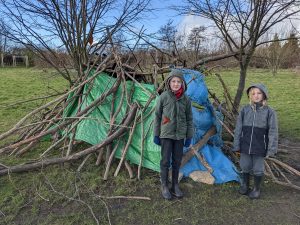Headteacher blog 4th February 2021
It has been a much better week as regards pupil attendance (>90% every day, up to 94%) but it has been exceptionally difficult staffing-wise, especially in our youngest classes. From Nursery to Y1, every class has been without its usual teacher for at least part of the week. Our other teachers and support staff have ‘stood up’ magnificently to cover their colleagues: showing great flexibility, professionalism and resilience in very difficult circumstances. The children have been very resilient and adaptable too. As I write, every teacher is back in the infants and things feel much more settled staffing-wise. We do appear to have decisively turned the curve as regards new infections and this is just taking ten days to work through.
On Monday, I told a story in assembly that included a reference to clay. I discussed where clay came from and that there was a layer of clay under our topsoil at school. I thought nothing more of it, but it seemed to intrigue the children and some members of Y5 began excavating clay from an exposed bank at playtime. This then developed into an open-cast mine and a clay shop selling to customers in KS2. The currency was sticks for a Y5 den, then there followed complaints from Y3 about high prices: a life-lesson about monopolies! I do like to see children making innovative use of the natural spaces around school and den making has taken off again. Year 4’s long-standing den by the path is magnificent and is clearly sturdy enough to withstand a very blustery seven days.
In class this week, I have seen lots and lots of writing. Most of this is in books, but some older children were using Chromebooks and a few children were using IT with specific writing aids. The use of IT can really help some children thrive as writers if they are otherwise held back by fine motor skill difficulties, or specific learning difficulties around spelling, for example. The quality of much of the writing appears to be very good and I am looking at ways that we might routinely publish our written stories and other text to provide a further audience and create a bank of standards to reference in the future.
Talking of standards, Michael Gove this week announced some new educational targets as part of his ‘levelling up’ agenda. By 2030, apparently, he is going to eliminate illiteracy and innumeracy at the end of primary school. He expects 90% of children to reach the expected standards in reading, writing and maths, whereas pre-pandemic only two thirds of children reached that level. There is no specific plan for how this is going to happen and it appears to be wishful thinking – perhaps he expects to be retired before being held accountable for this target. It is also really offensive to call any child that doesn’t reach expected standards illiterate or innumerate; some children with significant and specific SEND do really struggle, but many who just miss the expected levels can still read and do maths reasonably well. Furthermore, announcing the ‘ending’ of these problems, and then setting a target of ‘just’ 90%, suggests that Mr Gove may also struggle with the precise meaning of some words.
A missed opportunity in the levelling up announcements was the continued financial disadvantage to the North around funding for SEND. The North (and some southern coastal areas) are hugely over-represented in a list of councils being denied their proper levels of funding for SEND by a cap on gains as the new National Funding Formula continues to be delayed in its full implementation to protect those councils historically more favourably funded. This is denying Leeds another £2million next financial year, and has denied us much more than that over the past few years. This discrepancy would have taken just £60 million to sort out (if the other councils continued to be protected), and less if the proper implementation was applied.
Recent Posts
Recent Comments
- Ruth on Camp-Over 2025 is a hot one!
- Michelle Minton on Camp-Over 2025 is a hot one!
- Peter Harris on Malham
- Autumn on Malham
- Ellen on Outstanding Key Stage 2 Y6 SATs results




Leave a Reply